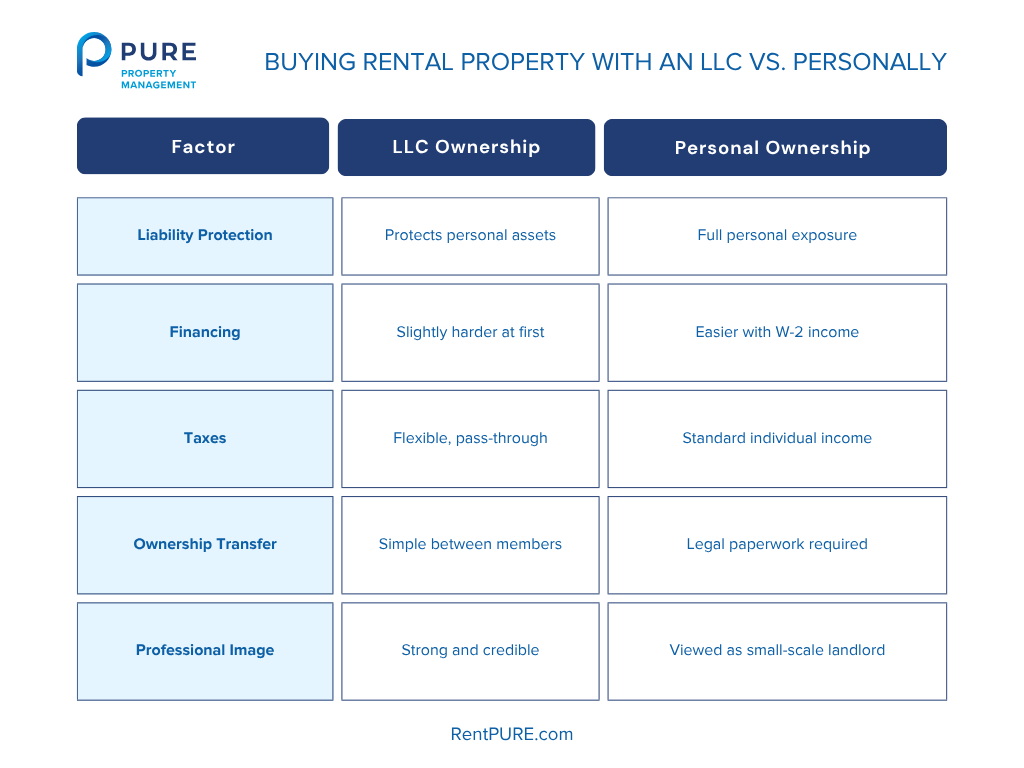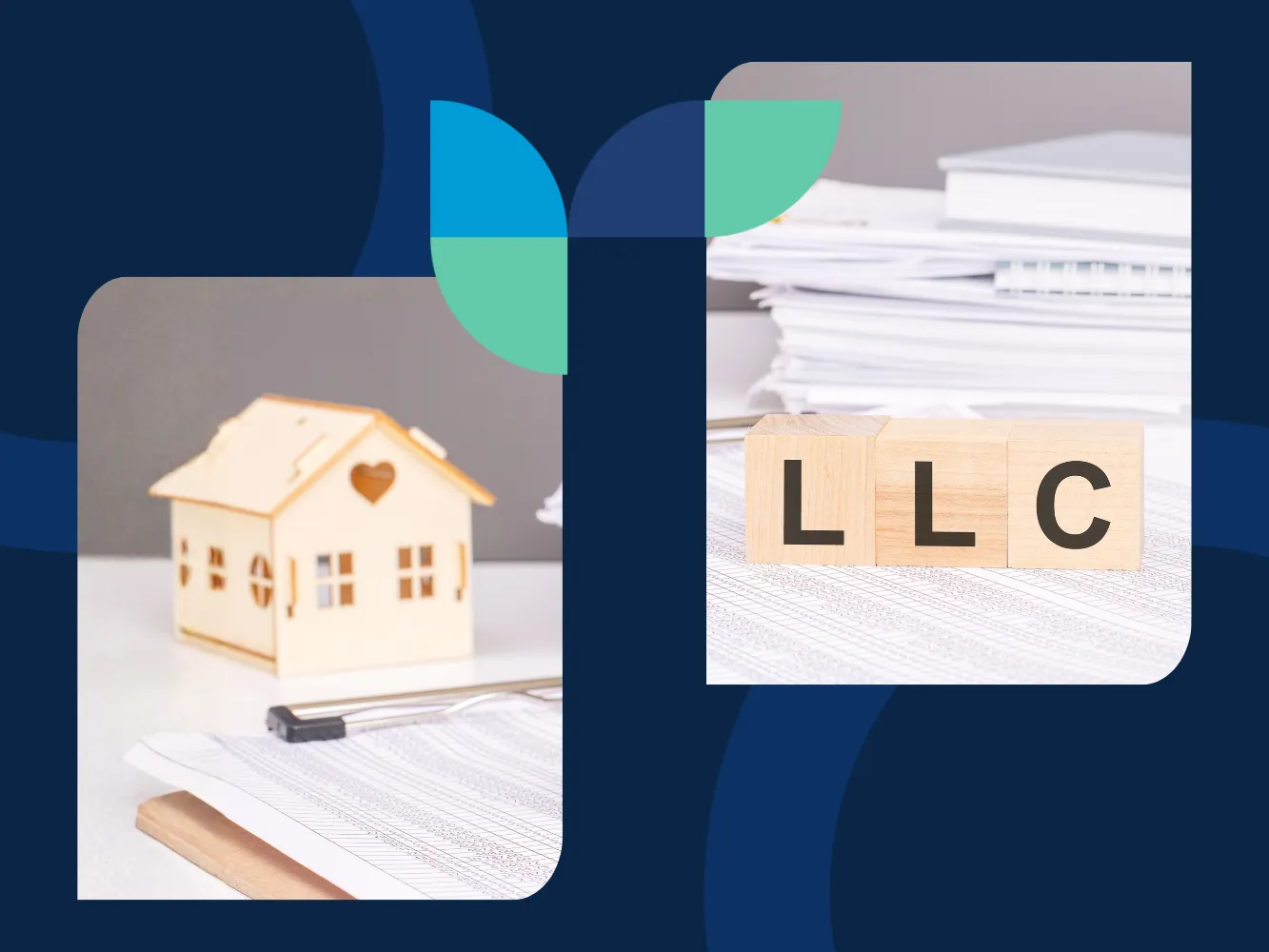Buying rental property is one of the smartest wealth-building moves you can make, but owning it under your personal name can also be one of the riskiest. That’s why many investors choose to buy rental property with an LLC.
It’s not about fancy paperwork or legal jargon. It’s about protection, professionalism, and building something that lasts. This guide breaks down exactly how to buy rental property with an LLC, what the real benefits are, and where beginners often get tripped up.
What Is an LLC (and Why It Matters in Real Estate)
An LLC, or Limited Liability Company, is a legal structure that separates your personal assets from your business assets. If something goes wrong with the property, such as a lawsuit, resident accident, or unpaid bill, only the assets owned by the LLC are at risk, not your car, savings, or home.
That separation is the whole point. When you buy rental property through an LLC, you’re creating a safety wall between your investments and your personal life. You also gain flexibility. You can add or remove partners easily, choose how your income is taxed, and build credibility with lenders, contractors, and residents. In short, buying rental property with an LLC makes you look and operate like a business, not a hobbyist.
Benefits of Buying Rental Property With an LLC
1. Liability Protection
If your resident slips on the stairs or claims property damage, they can sue your LLC, not you personally. That distinction keeps your personal assets shielded from business problems.
2. Tax Flexibility
LLCs can be taxed as sole proprietorships, partnerships, or corporations. This lets you optimize for your income, deductions, and goals instead of being locked into one model.
3. Easy Partnerships
Want to co-own a property? An LLC makes it simple to define ownership percentages, profit splits, and responsibilities, all in writing.
4. Professional Image
Residents, vendors, and lenders often take you more seriously when your leases, invoices, and payments come from a company rather than an individual name.
5. Organizational Simplicity
Keeping books, bank accounts, and taxes separate for each property becomes effortless when each one sits neatly inside its own LLC.
Example: Imagine a resident injures themselves on your rental property and sues. If you own it personally, your savings could be seized to pay damages. If your LLC owns it, only the property and its assets are exposed. That’s the difference between a financial setback and financial disaster.
How to Buy Rental Property With an LLC (Step-by-Step)
Buying rental property with an LLC isn’t complicated once you understand the process. The key is setting up your structure correctly from the start so your ownership, taxes, and financing all align. Here’s a clear breakdown of how to buy rental property with an LLC, step by step.
1. Form the LLC
Choose a name, register with your state, and file Articles of Organization. It’s quick and usually done online through your state’s business portal. Next, get an Employer Identification Number (EIN) from the IRS for tax and banking purposes.
2. Open a Business Bank Account
Your LLC needs its own bank account. Never mix personal and business funds; that’s called “piercing the corporate veil,” and it can destroy your liability protection.
3. Build Credit or Financing Options
At first, your LLC has no credit history. You can use your personal credit to guarantee a loan, or apply for a Debt Service Coverage Ratio (DSCR) loan, which qualifies based on property income rather than personal income. Private or commercial lenders also understand LLC purchases; they just require clean documentation.
4. Buy the Property in the LLC’s Name
All purchase documents, including the offer, title, and deed, should list your LLC as the buyer. For example, “Blue Ridge Rentals LLC” instead of your name. You’ll also need title insurance under the LLC and property insurance listing the LLC as the insured. If you already own a property personally, you can transfer it into an LLC later (more on that below).
5. Operate Like a Business
Keep clean records, sign leases through the LLC, and deposit rent into the LLC bank account. You’re not just a landlord anymore; you’re a business owner.
Should You Use an LLC for Your First Rental Property?
It depends on your goals and risk tolerance.
✅ Use an LLC if: you own or plan to own multiple rental properties, your property carries a higher risk, such as multi-units or short-term rentals, or you have partners or investors involved.
🚫 Skip or delay it if: you’re buying a small property personally financed under your own name, or you’re short on funds and can’t cover LLC setup or legal fees yet.
Some beginners start personally and move properties into an LLC later, especially once the portfolio grows and the cost becomes justified.
Tax Considerations When Buying Through an LLC
Owning rental property with an LLC won’t automatically save you taxes, but it does give you options.
Most LLCs use pass-through taxation, which means profits and losses flow directly to members’ tax returns, avoiding double taxation. If your business grows large enough, you can elect corporate taxation for different treatment. Repairs, maintenance, management fees, mileage, and depreciation all flow through your LLC as deductible business expenses.
Avoid these mistakes: mixing personal and business expenses, forgetting to file annual reports or renewals, or assuming an LLC replaces good insurance. It doesn’t. You need both.
When in doubt, talk to a real-estate-savvy CPA before you buy.
Financing Challenges (and How to Overcome Them)
Some banks hesitate to lend to new LLCs because they lack credit history.
Here’s how to make lenders comfortable: use personal guarantees early on while keeping the property under the LLC name; look for DSCR loans that qualify based on property income rather than personal finances; work with portfolio lenders since smaller banks often understand investors better than large national chains; and build business credit gradually using a business credit card and timely payments.
You’re building a track record. The first loan is the hardest; after that, doors open faster.
Transferring an Existing Property Into an LLC
If you already own a rental property personally, you can move it into your LLC, but you have to do it correctly.
First, check your loan terms. Most mortgages have a “due-on-sale” clause allowing the lender to demand full payment if ownership changes. Many investors simply notify their lender and continue paying on time, but they should check their risk first. Then, file a new deed transferring ownership from you personally to your LLC through a quitclaim deed or warranty deed, depending on your state. Next, update your insurance and leases so that the LLC appears as the insured party and landlord on all documents. Finally, record the transfer with your county clerk’s office or local land records department to make it official.
Pro tip: don’t rush this part. Work with a real estate attorney to avoid triggering taxes or loan complications.
Quick Takeaways
1. Should you use an LLC for your first rental property?
It depends on your goals. Use an LLC if you plan to own multiple rentals, manage higher-risk properties, or invest with partners. If you’re starting small and funds are tight, buy personally and transfer it later once your portfolio grows.
2. How are taxes handled when buying rental property with an LLC?
LLCs don’t automatically lower taxes, but allow flexibility. Most use pass-through taxation, letting income and expenses flow to your personal return. Keep finances separate and consult a CPA for proper deductions.
3. What are the financing challenges when buying rental property with an LLC?
Lenders may hesitate with new LLCs lacking credit history. Use personal guarantees at first, consider DSCR loans based on property income, and build business credit over time to secure better terms.
4. Can you transfer a property you already own into an LLC?
Yes, but do it carefully. Check your loan for a due-on-sale clause, transfer title correctly, update insurance and leases, and record the change with your county. Always consult a real estate attorney before transferring.
Common Myths About Buying Property With an LLC
“LLCs eliminate all taxes.”
No, they provide flexibility, not magic. You still pay income tax on profits.
“You can’t get financing under an LLC.”
False. It’s harder at first, but there are dedicated lenders for LLC borrowers.
“Once I have an LLC, I don’t need insurance.”
Wrong. LLCs protect ownership, not negligence. You still need landlord and liability coverage.
“It’s too complicated for beginners.”
Actually, forming and managing an LLC is straightforward, especially compared to recovering from a lawsuit.
Buying Rental Property With an LLC vs. Personally

Final Thoughts — Treat Real Estate Like a Business
When it comes to buying rental property with an LLC, the real advantage isn’t just legal protection — it’s control. You decide how income flows, how risks are managed, and how the business grows. Every property becomes a structured asset, not a personal gamble.
An LLC isn’t a shortcut; it’s a structure. It doesn’t guarantee success, but it guarantees clarity: transparent finances, clear ownership, and clear protection.
If you’re serious about real estate, it’s worth building that foundation early. While anyone can own property, pros own it through an LLC, safely, cleanly, and ready to scale.








